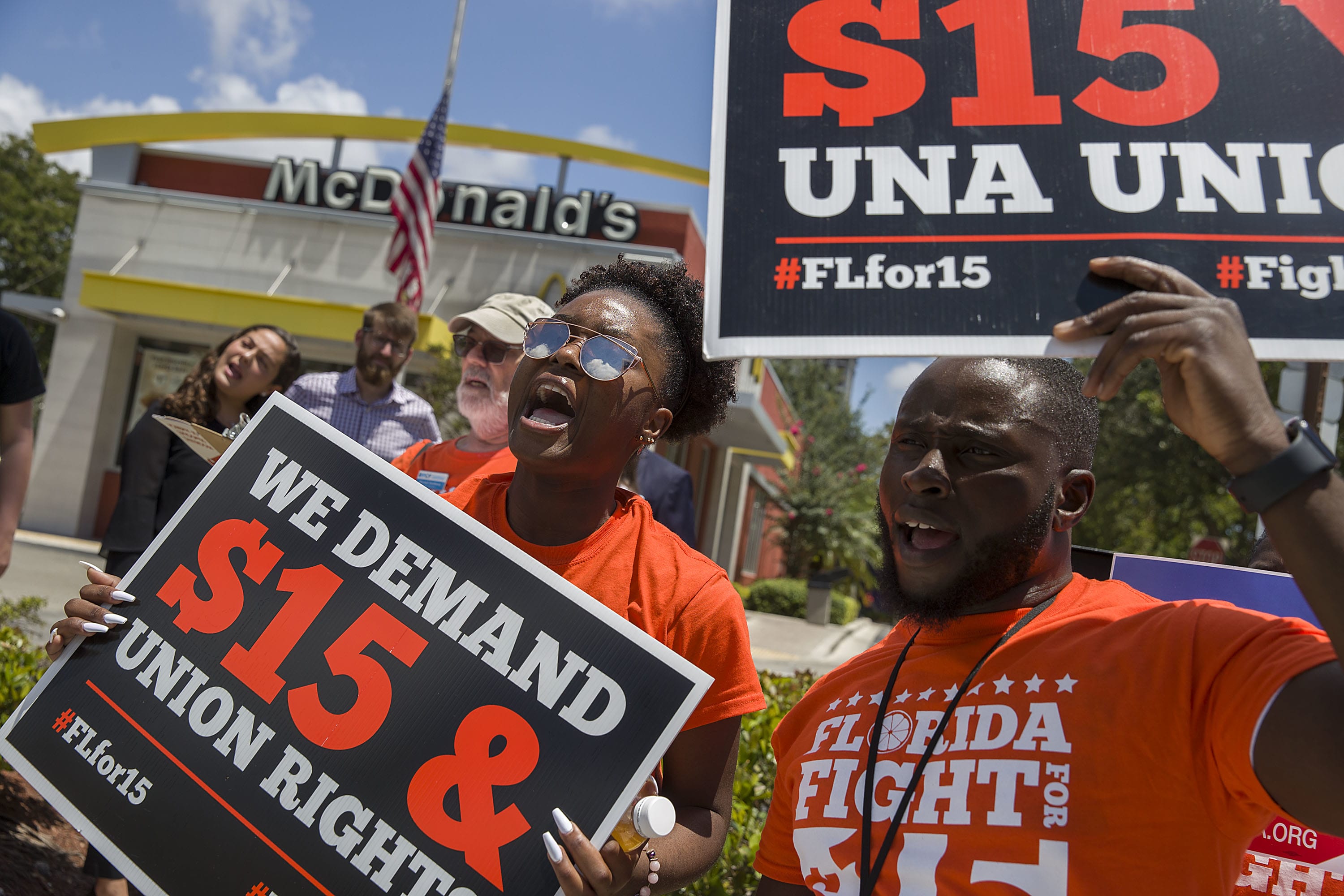
People gather together to ask the McDonald’s corporation to raise workers wages to a $15 minimum wage as well as demanding the right to a union on May 23, 2019 in Fort Lauderdale, Florida.
Joe Raedle / Getty Images
The move toward a $15 minimum wage is gaining steam, with 21 states raising minimum wages in 2019 and more increases on the way in 2020.
Restaurant workers and Democratic presidential candidates are among those leading the charge for higher wages.
Critics have argued that minimum wage hikes can hurt small businesses and cause job losses, yet hiring remained robust in 2019’s tight labor market. The lack of catastrophe could bolster Democrats’ arguments for higher federal wages heading into the election year, some say.
“In 2019, pay growth has been sluggish, but the fastest for low-wage workers,” Glassdoor senior economist Daniel Zhao said.
That’s largely due to minimum wage increases that went into effect in nearly half of U.S. states this year, affecting millions of workers across industries, including baristas and restaurant servers.
Seven states and Washington, D.C., have passed laws that will eventually bring their wage floors to $15 an hour. Some municipalities, like New York and Seattle, have already succeeded in raising their minimum wages to $15 an hour.
The movement for an hourly wage of $15 took off in 2012 when New York fast-food workers began striking and eventually formed the Fight for $15 and a union.
In 2020, even more wage increases are slated to go into effect. Nearly 7 million workers will be getting a pay raise starting Jan. 1, thanks to new minimum wage hikes going into effect, according to the Economic Policy Institute.
Restaurant operators have coped with the changes by raising menu prices and cutting worker hours, according to a Harri survey of 173 restaurants.
The federal minimum wage has remained unchanged since 2009, when it rose to $7.25 an hour. Since then, it has failed to keep up with inflation.
Democrats tried to change that earlier this year. In July, the Democratic-controlled House passed a bill that would make $15 the minimum wage. Senate Majority Leader Mitch McConnell refused to take up the issue in the Senate.
Analysis from the Congressional Budget Office found that raising the minimum wage to $15 by 2024 would benefit up to 27 million workers — but 1.3 million people would lose their jobs.
Democratic presidential candidates have largely supported a $15 minimum wage, although proposals differ about how to implement a higher federal minimum wage.
Some companies aren’t waiting for the federal government. Amazon and Bank of America are among the companies that announced hourly wages of $15 or more for workers. In addition to generating positive headlines, higher internal wages can also help those firms recruit employees more easily.
“That really signals the key underlying point about minimum wage hikes: the labor market is historically tight right now,” Zhao said.
In November, the unemployment rate sank to half-century low of 3.5% and job growth soared.
While McDonald’s has not committed to raising its internal minimum wage, the fast-food giant sent a letter to the National Restaurant Association earlier this year, telling the trade organization it will no longer participate in lobbying against minimum wage increases.
While labor costs are putting pressure on profits, some restaurants have also been trying to get creative to keep employees sticking around longer. The restaurant industry has high employee turnover rates, and hiring and training new workers is expensive. For example, in 2019, Papa John’s joined the growing number of companies that pay for employees’ college tuition. Chipotle Mexican Grill began offering quarterly bonuses to crew members based on the performance of their restaurants.
Still, compared with retail, the restaurant industry has a smaller concentration of large employers. Franchisees and local restaurants that lack the scale of a global fast-food chain may struggle more under the pressure of higher labor costs caused by minimum wage increases.
“Some low-performing or low-margin restaurants are pushed out by high costs. But in a healthy economy, new restaurants should move in to replace them,” Zhao said.

